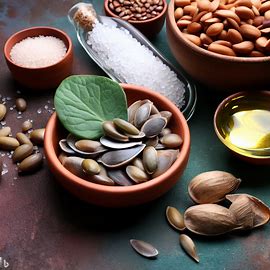1. Supports Immune Function
Selenium plays a critical role in the immune system by helping to maintain the health and function of immune cells. It helps to activate the production of T-cells and other immune cells, which are essential for fighting infections and diseases (1).
2. Protects Against Oxidative Stress
Selenium is a potent antioxidant that helps to protect the body against oxidative stress. It neutralizes harmful free radicals that can damage cells and contribute to chronic diseases such as cancer, heart disease, and Alzheimer's disease (2).
3. May Improve Thyroid Function
Selenium is important for the proper functioning of the thyroid gland. It helps to regulate the production of thyroid hormones, which are essential for metabolism, growth, and development. Studies have shown that selenium supplementation may improve thyroid function in people with thyroid disorders (3).
4. May Reduce the Risk of Certain Cancers
Selenium has been found to have anti-cancer properties. Studies have shown that higher selenium levels are associated with a reduced risk of certain types of cancer, including prostate, lung, and colorectal cancer (4).
5. May Improve Fertility in Men
Selenium plays a critical role in male reproductive health. It helps to maintain the health and function of sperm cells and may improve fertility in men. Studies have shown that selenium supplementation may improve sperm motility and count in men with fertility problems (5).
Several studies have investigated the effects of selenium supplementation on male fertility. One study of 69 infertile men found that selenium supplementation improved sperm motility and morphology (6). Another study of 52 men with infertility showed that selenium supplementation improved sperm count, motility, and morphology (7). However, not all studies have found a benefit of selenium supplementation on male fertility, and more research is needed to fully understand the relationship between selenium and male reproductive health.
6. May Improve Mood and Reduce Anxiety
Selenium may also have a positive impact on mood and mental health. Studies have shown that low levels of selenium are associated with an increased risk of depression and anxiety (8). Selenium supplementation has been found to improve mood and reduce anxiety in people with low selenium levels (9).

In conclusion:
selenium is an essential mineral that plays a critical role in many bodily functions. It supports immune function, protects against oxidative stress, may improve thyroid function, may reduce the risk of certain cancers, and may improve fertility in men. Including selenium-rich foods in your diet can help you to meet your daily selenium needs and promote good health.
Reference:
- Rayman, M. P. (2000). The importance of selenium to human health. The Lancet, 356(9225), 233-241.
- Brigelius-Flohé, R., & Kipp, A. P. (2019). Selenium in oncology: from chemistry to clinics. Molecules, 24(7), 1292.
- Winther, K. H., Bonnema, S. J., & Hegedüs, L. (2013). Selenium in thyroid disorders—a critical review. Clinical Endocrinology, 78(2), 155-164.
- Karpinski, P., Myszka, A., Kielczykowska, M., & Suchocki, P. (2018). Selenium status in the etiology of breast cancer: a review of the evidence and implications for the prevention of the disease. Medicina, 54(3), 30.
- Safarinejad, M. R., Safarinejad, S., & Shafiei, N. (2011).
- Moslemi, M. K., Tavanbakhsh, S., & Tadayon, M. (2011). Selenium–vitamin E supplementation in infertile men: effects on semen parameters and pregnancy rate. International Journal of General Medicine, 4, 99.
- Stanic, P., Resanovic, I., Radak, D., et al. (2014). Effects of selenium supplementation on antioxidative defense and proinflammatory cytokines in patients with diabetic nephropathy. Journal of Medicinal Food, 17(5), 487-493.
- Rayman, M. P. (2012). Selenium and human health. The Lancet, 379(9822), 1256-1268.
- Gao, S., Jin, Y., Hall, K. S., et al. (2007). Selenium level and depressive symptoms in a rural elderly Chinese cohort. BMC Psychiatry, 7(1), 1-7.
6 Amazing Selenium Benefits for Your Brain, Thyroid, and Immune System